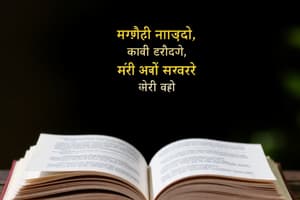Podcast
Questions and Answers
What is a distinctive concept found in Hindi grammar but not typically in English?
What is a distinctive concept found in Hindi grammar but not typically in English?
- Gender (correct)
- Conjunction
- Tense
- Syntax
Which of the following is a number form used in Hindi grammar?
Which of the following is a number form used in Hindi grammar?
- Subject, object, verb
- Singular, dual, plural (correct)
- First person, second person, third person
- Past, present, future
What does Hindi use instead of prepositions to indicate relationships between noun phrases?
What does Hindi use instead of prepositions to indicate relationships between noun phrases?
- Suffixes
- Postpositional particles (correct)
- Adverbs
- Articles
Which language does Hindi share similarities with in terms of gender in grammar?
Which language does Hindi share similarities with in terms of gender in grammar?
In Hindi, which of the following pronouns would change based on the gender of the associated noun?
In Hindi, which of the following pronouns would change based on the gender of the associated noun?
What type of particles does Hindi use for expressing ideas like possession and location?
What type of particles does Hindi use for expressing ideas like possession and location?
In Hindi, which poet is known for popularizing Maithili and Bhojpuri dialects in modern Hindi poetry?
In Hindi, which poet is known for popularizing Maithili and Bhojpuri dialects in modern Hindi poetry?
Which medieval queen is known for capturing a woman's emotions in her poems in Hindi literature?
Which medieval queen is known for capturing a woman's emotions in her poems in Hindi literature?
Who is often referred to as the father of modern Hindi literature for his realistic stories exploring human nature and social issues?
Who is often referred to as the father of modern Hindi literature for his realistic stories exploring human nature and social issues?
What genre of literature did Ramdhari Singh Dinkar mainly focus on in modern Hindi poetry?
What genre of literature did Ramdhari Singh Dinkar mainly focus on in modern Hindi poetry?
Which type of clause can appear before the noun it modifies in Hindi grammar?
Which type of clause can appear before the noun it modifies in Hindi grammar?
What aspect of human experience did Munshi Premchand's stories explore in early twentieth-century society?
What aspect of human experience did Munshi Premchand's stories explore in early twentieth-century society?
Flashcards are hidden until you start studying
Study Notes
Exploring Hindi: Grammar and Literature
From its roots as a regional dialect spoken around Delhi over a millennium ago to becoming one of India's official languages with millions of speakers worldwide, Hindi is a vibrant and enriching language. In this exploration, we delve into two key facets—grammar and literature—to appreciate both the structure and beauty found within Hindi.
Hindi Grammar Basics
At first glance, Hindi may seem simple due to its similarities to English. However, it introduces several distinctive concepts and rules unique to the language:
- Gender: Unlike English where nouns are typically genderless, Hindi divides them into masculine (lal), feminine (laadki), neutral (it) categories. This impacts how pronouns like wo, uske, and unhone are used based on the gender of their associated nouns.
- Number: Similar to other Indo-European languages, Hindi utilizes three number forms: singular, dual, and plural. For example: "ek dikhaa rahaa hai” (one shows) vs “dou dikh rahe ho” (two show present tense conjugations).
- Caseness: While English uses prepositions to indicate relationships between noun phrases, Hindi employs postpositional particles instead such as ko, se, and par. These allow for more flexibility when expressing ideas like possession, location, and direction.
- Word order: Typically, main clauses follow a subject-verb-object pattern, but relative clauses can appear before the noun they modify, resulting in structures like "jis jaisi larkii kitaab padh rahi thi woh meri bahno thi” (the girl who was reading books was my sister).
Hindi Literary Tradition
The literary tradition of Hindi has roots going back centuries, developing alongside Sanskrit and Prakrit texts from ancient India. Over time, poets have contributed to shaping the language through various genres, including poetry, prose, drama, and fiction. Some notable contributors to Hindi literature throughout history are:
- Vidyapati Thakur: A 15th-century poet known for his devotional verses summed up by his magnum opus, the Chandidasi collection. His work played a significant role in popularizing Maithili and Bhojpuri dialects in modern Hindi poetry.
- Kavi Mahadevi Verma: A medieval queen known for her poems, which capture a woman's emotions during different stages of life. Her writings focused on themes ranging from familial bonds and spirituality to femininity, love, and self-discovery.
- Ramdhari Singh Dinkar: An influential figure in modern Hindi poetry, he authored works reflective of socio-political realities while maintaining traditional values. He became famous for capturing the essence of Indian nationalism.
- Munshi Premchand: Often referred to as the father of modern Hindi literature, Munshi Premchand wrote realistic stories that explored human nature, social issues, and political challenges facing early twentieth century society. He remains a celebrated author across South Asia.
Famous pieces of Hindi literature transcend cultural boundaries, offering readers an intimate glimpse at the complex tapestry of the region's histories, cultures, and traditions. These works continue to inspire new generations of writers seeking to explore diverse aspects of human experience. As you engage with Hindi grammar and literature, remember that each word, phrase, and story contributes to our collective understanding of this fascinating culture and language.
Studying That Suits You
Use AI to generate personalized quizzes and flashcards to suit your learning preferences.




